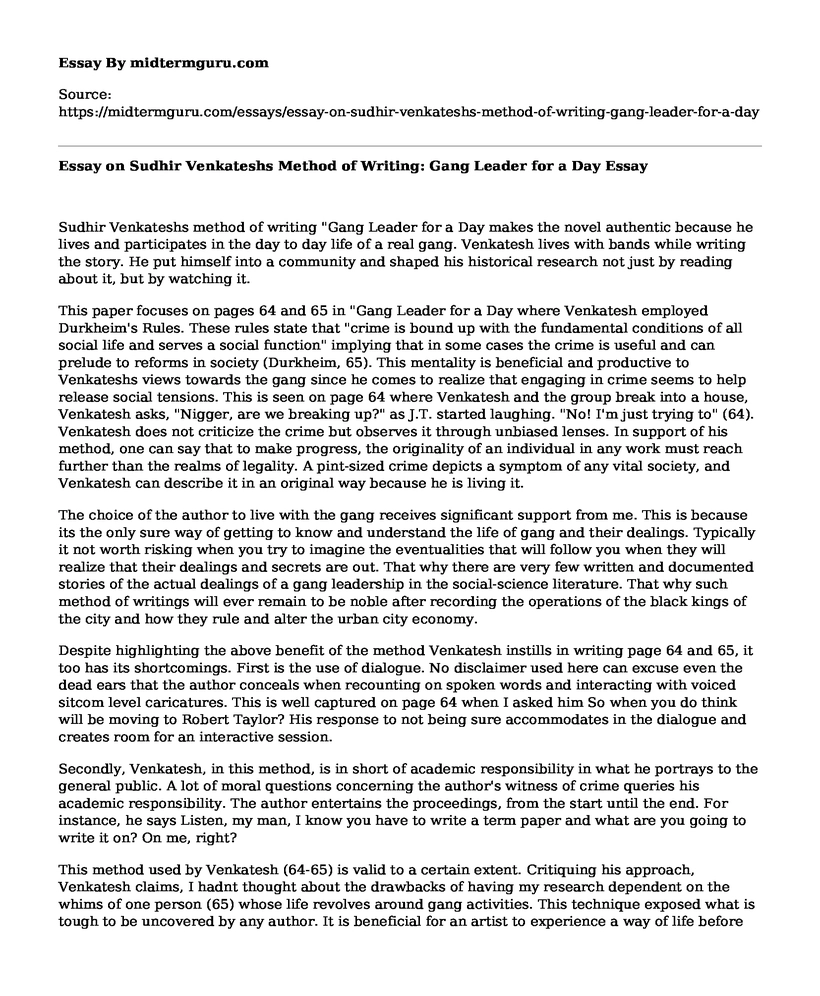Sudhir Venkateshs method of writing "Gang Leader for a Day makes the novel authentic because he lives and participates in the day to day life of a real gang. Venkatesh lives with bands while writing the story. He put himself into a community and shaped his historical research not just by reading about it, but by watching it.
This paper focuses on pages 64 and 65 in "Gang Leader for a Day where Venkatesh employed Durkheim's Rules. These rules state that "crime is bound up with the fundamental conditions of all social life and serves a social function" implying that in some cases the crime is useful and can prelude to reforms in society (Durkheim, 65). This mentality is beneficial and productive to Venkateshs views towards the gang since he comes to realize that engaging in crime seems to help release social tensions. This is seen on page 64 where Venkatesh and the group break into a house, Venkatesh asks, "Nigger, are we breaking up?" as J.T. started laughing. "No! I'm just trying to" (64). Venkatesh does not criticize the crime but observes it through unbiased lenses. In support of his method, one can say that to make progress, the originality of an individual in any work must reach further than the realms of legality. A pint-sized crime depicts a symptom of any vital society, and Venkatesh can describe it in an original way because he is living it.
The choice of the author to live with the gang receives significant support from me. This is because its the only sure way of getting to know and understand the life of gang and their dealings. Typically it not worth risking when you try to imagine the eventualities that will follow you when they will realize that their dealings and secrets are out. That why there are very few written and documented stories of the actual dealings of a gang leadership in the social-science literature. That why such method of writings will ever remain to be noble after recording the operations of the black kings of the city and how they rule and alter the urban city economy.
Despite highlighting the above benefit of the method Venkatesh instills in writing page 64 and 65, it too has its shortcomings. First is the use of dialogue. No disclaimer used here can excuse even the dead ears that the author conceals when recounting on spoken words and interacting with voiced sitcom level caricatures. This is well captured on page 64 when I asked him So when you do think will be moving to Robert Taylor? His response to not being sure accommodates in the dialogue and creates room for an interactive session.
Secondly, Venkatesh, in this method, is in short of academic responsibility in what he portrays to the general public. A lot of moral questions concerning the author's witness of crime queries his academic responsibility. The author entertains the proceedings, from the start until the end. For instance, he says Listen, my man, I know you have to write a term paper and what are you going to write it on? On me, right?
This method used by Venkatesh (64-65) is valid to a certain extent. Critiquing his approach, Venkatesh claims, I hadnt thought about the drawbacks of having my research dependent on the whims of one person (65) whose life revolves around gang activities. This technique exposed what is tough to be uncovered by any author. It is beneficial for an artist to experience a way of life before writing about it if the authors intention is to explain an individual societys way of life.
Work cited
Durkheim, Emile, and Kenneth Thompson. Readings from Emile Durkheim. London: Routledge, 2004
Venkatesh, Sudhir A. Gang Leader for a Day: A Rogue Sociologist Crosses the Line. London: Penguin Books, 2009. Print
Cite this page
Essay on Sudhir Venkateshs Method of Writing: Gang Leader for a Day. (2021, May 26). Retrieved from https://midtermguru.com/essays/essay-on-sudhir-venkateshs-method-of-writing-gang-leader-for-a-day
If you are the original author of this essay and no longer wish to have it published on the midtermguru.com website, please click below to request its removal:
- Essay on Maintenance and Operation of Museums
- Example of Debates About the World Oldest Man - Paper Example
- Paper Example on Principles of User Interface Design
- Paper Example on Modern Television Culture
- Paper Example on Using SMART Goals on Social Learning
- Essay Sample on Social Media: My Experiences With Facebook
- Movie Analysis Essay on As Dreamers Do







